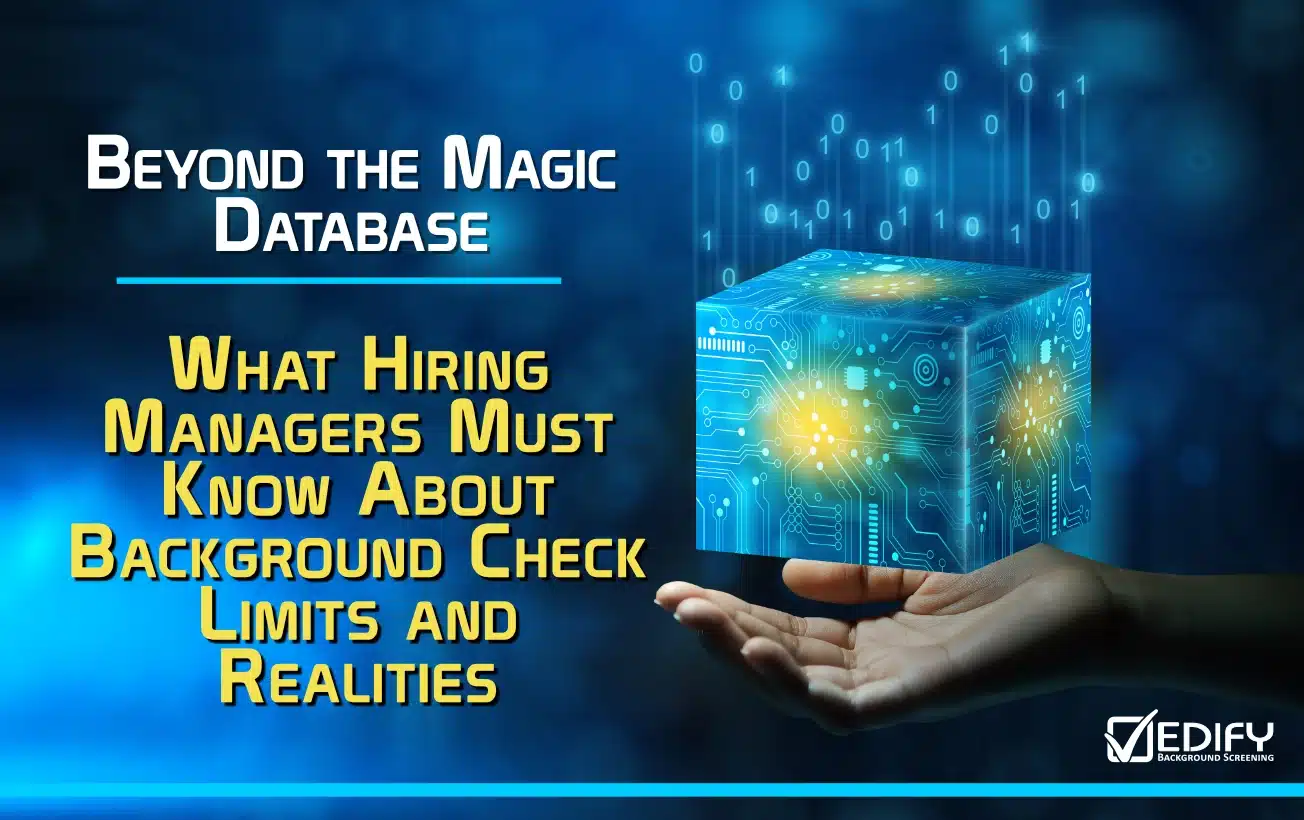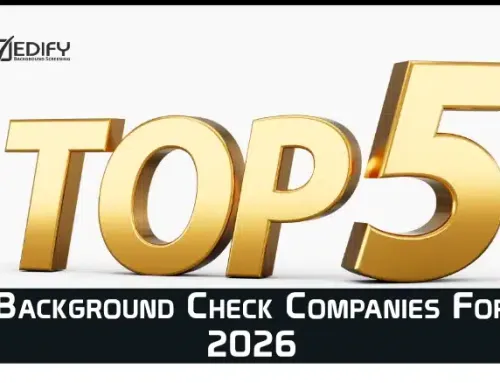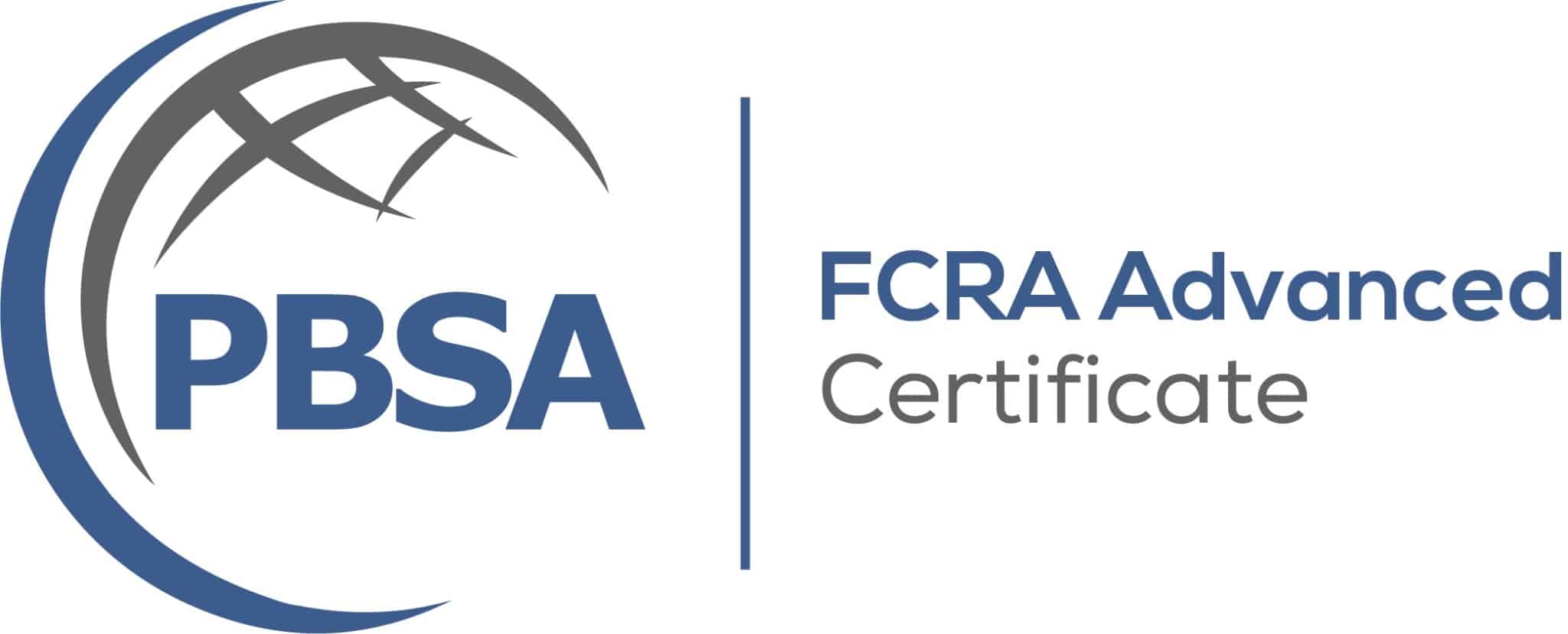Beyond the Magic Database: What Hiring Managers Must Know About Background Check Limits and Realities
It’s a common assumption: when you run a background check, there must be a master “national database” that instantly returns every criminal record across the country. In reality, no such universal database exists. Background screening requires pulling records from multiple sources, each with its own limitations, reporting delays, and legal requirements.
For HR professionals and hiring managers, understanding these limits isn’t just a technical detail — it’s essential for understanding how the background check process works to make fair, compliant, and informed hiring decisions.
The Myth of a Universal Criminal Database
There is no single, comprehensive database that contains every criminal record in the United States. Instead, criminal records are maintained across thousands of county courthouses, state repositories, and federal jurisdictions. Each operates on its own schedule for updates, and in many cases, access is limited or delayed.
So what are “nationwide criminal databases” really?
Commercial criminal databases are collections of records compiled from a variety of public sources, such as:
-
State repositories (when available)
-
Department of Corrections records
-
Administrative Office of Courts data
-
Sex offender registries
-
Certain county-level bulk uploads
These databases are valuable because they provide broad coverage and can flag potential records outside the obvious places where a candidate has lived or worked. In the industry, this is often called “pointer information” — data that helps direct where additional research should be performed.
However, they have significant limitations:
-
Not every jurisdiction reports into them.
-
Some jurisdictions update infrequently, leaving records outdated.
- They do not take into account state specific reporting rules regarding convictions and non-convictions.
-
Records may contain clerical errors or lack final dispositions.
Because of these gaps, a database search can never serve as the final word.
Why Source Verification Still Matters
The Fair Credit Reporting Act (FCRA) requires that any record identified in a database be verified at the originating source — typically a county courthouse or state repository — before it can be included in a consumer report. This ensures the information is timely, accurate, and up to date.
For HR and hiring managers, the takeaway is clear: databases are a useful tool for broad screening, but true compliance and reliability come only from source-verified searches.
So-called “instant database checks” can sound attractive, but they are incomplete on their own. They may help identify where further research is needed, but relying on them exclusively exposes your organization to risk.
Coverage Gaps Every Hiring Manager Should Know
No background check is one-size-fits-all. Each type of search has its own scope and limitations:
-
County Criminal Records – Often the most accurate, since they come directly from the courthouse, but coverage is limited to the jurisdictions where the candidate has lived, worked, or studied.
-
Statewide Criminal Repositories – Quality varies greatly; some update daily, while others may lag months behind. Not every county reports consistently to the state level.
-
Federal Criminal Searches – Cover only federal-level offenses (e.g., fraud, drug trafficking, immigration violations) that will not appear in county or state searches.
-
National Criminal Databases – Useful for flagging potential records across broad geographies, but incomplete and never FCRA-compliant without courthouse verification.
-
International Checks – Each country has unique rules, fees, and timelines, making them more complex to manage and interpret.
Beyond these general differences, reporting rules also vary significantly across jurisdictions. While the FCRA limits reporting of non-convictions to seven years, many states go further:
-
Some states apply a seven-year limit to convictions as well as non-convictions, regardless of the seriousness of the offense.
-
Others restrict reporting of certain drug-related convictions to as little as two years.
-
Increasingly, states are adopting Clean Slate legislation, which allows qualifying criminal records — including some felonies — to be automatically expunged or sealed after a set period.
The result is that a record reported last year may no longer appear this year if it was subject to a Clean Slate removal. For HR teams, this highlights why rechecks can sometimes return “clear” even if a prior report showed a conviction.
This is exactly why it’s so important to work with a quality Consumer Reporting Agency (CRA) like Edify. A trusted CRA doesn’t just pull data — it interprets complex reporting rules, verifies records at the source, and ensures that what you receive is accurate, timely, and legally compliant. In a landscape where the rules are constantly evolving, having an experienced partner helps HR and hiring managers navigate the complexity with confidence.
Practical Guidance for HR & Hiring Managers
To get the most from background checks and ensure due diligence, HR and hiring leaders should prepare their organizations with a clear plan. Consider this checklist as a foundation:
1. Set Clear Policies
-
Define what types of checks are required for each role (criminal, employment, education, credentials, MVR, etc.).
-
Apply them consistently across all candidates to reduce bias and ensure compliance.
2. Educate Leadership
-
Explain that background checks are thorough, not instant — results often depend on courthouse access, state rules, or international processes.
-
Set realistic expectations about turnaround times to avoid pressure for shortcuts.
3. Balance Accuracy with Candidate Experience
-
Communicate timelines clearly to applicants.
-
Provide a transparent process so candidates understand what’s being checked and why.
4. Partner with a credible Consumer Reporting Agency (CRA)
-
Work with a PBSA-member provider like Edify Background Screening, which verifies records at the source, interprets complex reporting rules, and ensures compliance with federal and state laws.
-
Confirm your CRA uses secure technology and follows strict data protection standards.
5. Delineate Roles and Risk Levels
-
Identify positions with higher risk exposure (e.g., financial responsibility, access to sensitive data, work with children or vulnerable adults).
-
Assign tiered screening packages:
-
Entry-Level Roles: Basic criminal and identity checks.
-
Mid-Level Roles: Add employment, education, and credential verification.
-
High-Risk/Sensitive Roles: Include comprehensive checks such as federal searches, credit (where permissible), motor vehicle records, professional licenses, and drug testing.
-
-
Document these tiers in your HR policy so screening is both consistent and defensible.
6. Stay Current with Evolving Laws
-
Monitor federal and state regulations, including Clean Slate initiatives and state-specific reporting limits.
-
Update policies when laws change to avoid compliance gaps.
7. Schedule Periodic Rechecks
-
Consider annual or role-based rechecks for ongoing positions of trust.
-
Clearly communicate this policy to employees during onboarding.
8. Train Your HR Team
-
Provide ongoing training on compliance, adverse action procedures, and FCRA requirements.
-
Ensure staff can confidently explain results and processes to both leadership and candidates.
How to Select the Right Background Screening Firm
Not all Consumer Reporting Agencies (CRAs) are created equal. While some providers focus on high-volume, low-touch processing with little client interaction, others may specialize in niche industries or operate with outsourced support models. For SMBs and organizations that value a compliance-first, service-oriented partnership, choosing the right firm can make all the difference.
When evaluating a background screening provider, HR and hiring managers should consider the following:
-
Industry Expertise
-
Does the CRA understand your industry and its compliance requirements?
-
Some CRAs focus heavily on staffing, healthcare, or enterprise accounts — ensure they have experience supporting organizations like yours.
-
-
Service Model
-
Is support live and accessible, or are you routed through self-service portals with limited human interaction?
-
Look for a provider that offers a dedicated account team to ensure consistency and accountability.
-
-
Geographic Workforce
-
Ask whether support and operations are based in the U.S. or outsourced overseas.
-
EDIFY is proud to maintain a 100% U.S.-based workforce, ensuring quality control, data security, and responsiveness.
-
-
Compliance and Accreditation
-
Confirm that the provider is a PBSA-member, demonstrating adherence to the highest industry standards.
-
Verify that they have a strong track record of FCRA compliance and stay current with evolving state and federal laws.
-
-
Technology and Integration
-
Assess how the firm’s platform integrates with your applicant tracking system (ATS) or HRIS.
-
Look for user-friendly portals, secure data handling, and automation that streamlines your workflow without sacrificing accuracy.
-
-
Customization Options
-
Can the provider tailor screening packages based on role risk levels (entry-level vs. high-trust positions)?
-
Ensure they can create flexible solutions rather than forcing a one-size-fits-all package.
-
-
Client Support Philosophy
-
Do they see themselves as a vendor, or as a true partner in your hiring process?
-
At Edify, we emphasize relationship-driven service, offering real-time assistance, proactive guidance, and education to help clients remain compliant and confident.
-
Take Control of Your Background Check Process
Background checks are not a one-click search. They are a structured process designed to balance speed, accuracy, compliance, and fairness. By understanding the limits of databases and the importance of source verification, hiring managers can make better decisions, protect their organization, and provide a more transparent candidate experience.
If you’re ready to strengthen your hiring process with accurate, compliant background screening, contact Edify Background Screening to learn how we can support your team.
FAQ
1. Is there a “master” criminal database I can search to get all criminal records at once?
No, there is no single comprehensive criminal database in the United States. Criminal records are spread across thousands of local, state, federal, and special jurisdiction sources, each with its own reporting process and rules. Commercial “nationwide” databases exist, but they are really just large collections of records from select jurisdictions. They are useful as pointer tools, but they are not complete and often miss important details. For this reason, database searches should always be combined with county or state-level checks for accuracy.
2. Why is it necessary to verify records at the source, even if they appear in a database?
Any record that comes back from a database must be verified at the original court or official repository before it can be used in an employment decision. This is a requirement under the Fair Credit Reporting Act (FCRA), which ensures that information reported about a candidate is accurate and up to date. Court records can change over time through dismissals, appeals, expungements, or updates to case status. Without direct verification, employers risk acting on outdated or incorrect data, which can create compliance issues and legal liability.
3. What kinds of “gaps” or limitations should hiring managers expect in background checks?
Even the most thorough background check has limitations. Some jurisdictions do not share records with state or national systems, while others experience delays in updating their databases. Rules about how long certain records can be reported also vary by state, especially when it comes to non-convictions or sealed cases. Recent Clean Slate legislation in many states means older records may no longer appear at all. International records can pose additional challenges due to differences in recordkeeping and access. Employers should understand these gaps to set realistic expectations for their screening program.
4. How should organizations design a background screening policy given these constraints?
A strong background screening policy takes these limitations into account by setting clear guidelines for what types of checks are conducted and how results are used. Policies should align screening types with the level of risk for each role, apply the process consistently across all candidates, and include clear communication so applicants know what to expect. Employers may also consider periodic rescreening of employees in sensitive positions to capture new records over time. Finally, staying current with changing laws—such as Clean Slate or ban-the-box requirements—helps ensure the policy remains compliant and fair.
5. What criteria should HR use when selecting a background screening provider (CRA)?
Choosing the right background screening partner is critical to building a reliable and compliant program. Look for a provider with proven experience in your industry and a strong understanding of federal and state compliance requirements. Membership in professional associations like the PBSA (Professional Background Screening Association) is a good indicator of credibility. The provider should verify records directly at the source, not just rely on database results, and offer tools that integrate with your ATS or HR system. Equally important is responsive customer support and a collaborative approach, so you have a partner who can help you navigate complex screening challenges.
Additional Resources
-
Federal Trade Commission — “Background Checks: What Employers Need to Know”
This resource offers plain-language guidance on compliance with the Fair Credit Reporting Act (FCRA) and discrimination laws when using background checks. Federal Trade Commission -
U.S. Equal Employment Opportunity Commission (EEOC) — “Background Checks: What Employers Need to Know”
Covers how background screening intersects with federal nondiscrimination laws and practical compliance guidance for employers. EEOC -
Professional Background Screening Association (PBSA) — Practical Guidance / Resource Library
PBSA provides operational and policy guidance built by industry professionals, including best practices and accreditation standards. PBSA+1
The resources provided here are for educational purposes only and do not constitute legal advice. We advise you to consult your own counsel if you have legal questions related to your specific practices and compliance with applicable laws.














